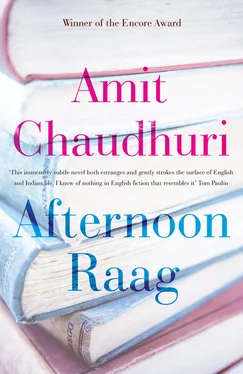My parents knew each other from childhood; both were born in undivided Bengal, in Sylhet, which is now in Bangladesh. In the late forties, my father went to England, and six years later, my mother; there, in London, they were married. In those days, Indian women were still a rare sight in England, and often, as the newly-married couple walked down the road, they would be stopped by an Englishman who would politely request the young man’s permission to take his wife’s picture. The young man would then, as he still does so often to so many things, give his good-natured and gentle assent. Prying but harmless old women would enquire, at lonely bus-stops, what the red dot on my mother’s forehead signified; and for many months, a picture of her hung among other photos at a studio on Regent Street. Such a good cook was she, and such an inspired purchaser of herring and stewing lamb, that my poor father, neglected and underfed for six years, rapidly gained weight and happiness after marriage. While my mother took up a full-time clerical job, my father sat for and, at last, passed his professional exams. It was while working at the India Office, and making conversation with the large fish-monger, who called her ‘love’ and ‘dear’, and saved the pieces of turbot and halibut most precious to her, that she picked up spoken English. Like most Bengalis, she pronounces ‘hurt’ as ‘heart’, and ‘ship’ as ‘sheep’, for she belongs to a culture with a more spacious concept of time, which deliberately allows one to naively and clearly expand the vowels; and yet her speech is dotted with English proverbs, and delicate, un-Indian constructions like, ‘It’s a nice day, isn’t it?’ where most Indians would say, straightforwardly, ‘It’s a nice day, no?’ Many of her sentences are plain translations from Bengali, and have a lovable homely melody, while a few retain their English inflections, and are sweet and foreign as the sound of whistling.
They returned to India by sea, on the Anchor Line First Class. Those were the last days of the world’s flatness, when, as in a map in an atlas, the continents were still embroidered upon a vast blue handkerchief of water. That fifteen-day-long, floating world between two worlds — England and India — surrounded on all sides by horizon, remains clearly in my mother’s mind as a brief enchantment. What marvellous food was served, both Indian and Continental, what memorable puddings! In the evening, the ladies in saris and evening dresses, accompanied by their husbands, went out to the deck to enjoy the cool air. When darkness falls at sea, and the only light is the light on the deck on which people chat with each other as if on a promenade in a town, dressed in clothes selected after quiet and unobtrusive meditation — the selection representing some solitary, individual but habitual predilection which only the spouse recognizes — how unique, in that darkness of water and sky, must seem the human creation of evening! Every few days, there was a party at the dining-hall; a band played; others took part in musical chairs while my parents watched; often, classic films were shown. Such an air of celebration — its echo reminds me of similar occasions in my childhood, only I am not present. When I imagine my parents as they were before my birth, it is like encountering those who are both familiar and changed, like recognizing, with sudden pleasure, children who have returned home after many years.
After Shehnaz and I had been seeing each other for about a week, I invited her to lunch at my college hall. I waited in front of the lodge, loitering invisibly while people went about, rushing, as they always do, with a special motivated speed at lunchtime. The only thing fixed in that scene was the porter, who sat inside his lodge, in a world a little detached from ours, and ignored me stolidly. When the clock struck one, I began to walk towards the hall, and Shehnaz came from behind and caught up with me, somewhat breathless. We curved round the grassy oval patch together, and entered a looming tunnel and then emerged into the second quad, with a large square of green to our right, and to our left, the L-shaped facade of the old buildings, with their consecutive staircases and rows of neighbourly windows. It must have been a warm day, for Shehnaz was wearing a white cotton top, with a message supporting the Palestinian cause printed boldly upon it, ending in a vivid exclamation mark; I noticed then how small her breasts were, two small bumps beneath her loose top, and how bony and thin she was, her collar bones radiating delicately and symmetrically beneath her neck, their outlines becoming clearer as she bent forward.
The hall had great length and depth, and yet, from the moment one joined the queue collecting trays and food, one failed to see it in perspective. That day I realized, with the disappointment one feels when discovering another person’s hidden nature, that Shehnaz was a vegetarian. With a plate full of peas and salad, she stood waiting for me to pay at the till. Feeling ill at ease, we then sat facing each other at one of the interminable parallel tables that ran from one end of the hall to another. Light filled the transparent sections of the stained-glass windows. Beneath them were portraits of the dead Masters of the college, luminous presences in costume, and beneath the portraits was the table at which the Chinese graduates sat. They looked no older than boys, with straight black hair and clean, animated faces, leaning across to shout to each other in Chinese, drawing back dramatically, or lolling forward, collapsing, and settling a head upon a crooked elbow on the table. In appearance, they were more Westernized than Indians, at ease in their European clothes, industriously devouring steak and kidney pie, but they hardly spoke to the English students, forming a little island at that table at lunchtime, buoyant, and full of movement. They made a domestic noise, like brothers watching a football match on television, with sounds that signified violent disagreement, or native exclamations of astonishment, but they might have been, for all I knew, discussing mathematical formulae or their syllabus. With the Chinese table as our background, Shehnaz and I ate together, more or less silently.
When we came out from the hall, we sat for some time on one of the benches on the edge of the green square, with our backs to the library windows. From there, while we talked, we could see people who had finished lunch appearing both from the hall and the Senior Common Room. Though I was not aware of it then, Mandira’s room, which she had newly occupied, was behind us, over our shoulders. I would later become familiar with its rectangular window, whose shutter was lifted on hot days. On the roof above the room, there was a skylight, a narrow glass lid framed by wood, its simple, straight angles standing out against its darker background, and clearly discernible in this brief, summarized version from below. It was by this skylight that I would later identify Mandira’s room.
The road that led to Shehnaz’s college passed, at one point, over a canal. Then the road became, for a very tiny distance, a bridge, and one could sit on the wall on one side before entering the college on the left.
The canal had its own life. Ducks climbed curiously on to its bank or paddled upon the water with the utmost seriousness; twigs, branches, and leaves drifted in from the south and travelled northward. Sometimes one saw a rare polythene bag or can in the water, and, occasionally, a pair of tall, unhurried swans also headed towards a destination. Such were the daily journeys on the canal, but once, I saw two men and a woman out on a punt, laughing and shouting, and as I watched from above, the brown tops of their heads, a community of legs, and the interior of the boat with its portioned spaces and shadows became, for a few moments, visible, a glimpse of dark secrecies. On the college side, the grassy bank sloped upwards, but on the other side, there was a black wall and the backyards of houses. When one entered the college, and began one’s walk towards the rooms, one saw, to the right, across the canal, signs of domesticity seldom seen in these parts of Oxford, with its student flats and old, scholastic buildings, and elsewhere in England mainly from train windows — identical square backyards, each fencing in its peculiar organization of clotheslines, laundry, children, cats, and women, beginning suddenly at one point and ending as suddenly at another.
Читать дальше












